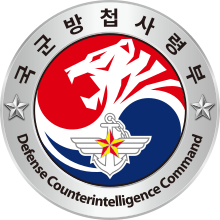Defense Counterintelligence Command
| Defense Counterintelligence Command | |
|---|---|
| 국군방첩사령부 | |
 | |
| Active | Military Security Command (7 October 1977 – December 1990) Defense Security Command (January 1991 – August 2018) Defense Security Support Command (September 2018 – October 2022) Defense Counterintelligence Command (November 2022 – present)[1][2] |
| Country | |
| Type | ROK Armed Forces Inter-service command |
| Role | Counterintelligence Counterterrorism Criminal investigation HUMINT Military intelligence[3] |
| Part of | Ministry of Defense |
| Garrison/HQ | Gwacheon, Gyeonggi-do, South Korea |
| Motto(s) | Limitless Dedication for the Protection of Liberty of the Republic of Korea[4] |
| Website | Official website in English Official website in Korean |
| Commanders | |
| Current commander | Lt. Gen. Yeo In-hyung |
| Notable commanders | General Chun Doo-hwan General Roh Tae-woo Lieutenant General Chang Do-yong[5] |
| Defense Counterintelligence Command | |
| Hangul | 국군방첩사령부 |
|---|---|
| Hanja | 國軍防諜司令部 |
| Revised Romanization | Gukgun Bangcheop Saryeongbu |
| McCune–Reischauer | Kukkun Bangch'ŏp Saryŏngbu |
The Republic of Korea Armed Forces's Defense Counterintelligence Command (DCC; Korean: 국군방첩사령부; Hanja: 國軍防諜司令部) was founded as the Army Counter Intelligence Corps (commonly known as CIC or KACIC;[6][7] meaning: Special Operation Forces) on 21 October 1950.[1][2] The DCC is primarily responsible for intelligence missions such as military security, defense industry security and forensic investigations.[8][9][10]
The unit was reorganized into the Defense Counterintelligence Command on 1 November 2022.[1][2]
History
The Defense Counterintelligence Command was formally activated in October 1977 under the name Military Security Command (MSC; Korean: 국군보안사령부; Hanja: 國軍保安司令部).[1][2] This merger of the Army Security Command, the Navy Security Unit, and the Air Force Office of Special Investigations produced a single, integrated unit under the direct command and operational control of the minister of national defense.[1][2]
Chun Doo-hwan became chief of the Defense Security Command (DSC; Korean: 국군기무사령부; Hanja: 國軍機務司令部) in February 1979, eight months before Park Chung-hee was assassinated on October 26, 1979. From his position as commander of the DSC, Chun effectively became chief investigator of the assassination, said Don Oberdorfer in his book The Two Koreas.[11] On December 12, 1979, a group of generals led by Chun arrested martial law commander General Jeong Seung-hwa, the army chief of staff, and seized key sites in the capital.[12]
The DSC's involvement in 1979 was considered and defined as attempt of a coup by state council.[13]
Criticism
On November 11, 2011, the Seoul National Labor Relations Commission exposed a Defense Security Command member who had been illegally collecting the information of civilians registered in the National Health Insurance Corporation for three and a half years.[14]
References
- ^ a b c d e "History". Defense Counterintelligence Command. Retrieved 3 February 2024.
- ^ a b c d e "연혁". Defense Counterintelligence Command. Retrieved 3 February 2024.
- ^ "Duties". Defense Counterintelligence Command. Retrieved 3 February 2024.
- ^ "Command Spirit". Defense Counterintelligence Command. Retrieved 3 February 2024.
- ^ During the KACIC period.
- ^ 體育大會어제閉幕 靑年의意氣遺憾없이發揚. Naver.com (in Korean). Dong-A Ilbo. 1953-10-23. Retrieved 2021-04-03.
- ^ 뉴스데스크 5–60년대 육군 특무부대원들 조선시대 마패처럼 메달 갖고 다녀[전봉기] (in Korean). 2006-04-16. Retrieved 2021-04-03.
- ^ "Military Security". Defense Counterintelligence Command. Retrieved 4 February 2024.
- ^ "Defense Industry Security". Defense Counterintelligence Command. Retrieved 4 February 2024.
- ^ "Forensic investigation". Defense Counterintelligence Command. Retrieved 4 February 2024.
- ^ Addison-Wesley, Reading, Mass, 1997, ISBN 0-201-40927-5, p. 121
- ^ Lee Wan-bum. "12·12 군사반란 (十二十二 軍事叛亂)". Academy of Korean Studies. Archived from the original on 4 February 2024. Retrieved 4 February 2024.
- ^ "뉴스1 | 계엄문건 67장 '세부자료' 공개…탄핵기각시 '실행' 수준 Detailed Martial law document 67 pages open to public". 뉴스1 (in Korean). Archived from the original on 2020-06-10. Retrieved 2020-03-26.
- ^ Kim (김), Tae-gyu (태규) (2011-11-12). 기무사, 건보공단서 3년6개월간 민간인 62명 개인정보 빼냈다.. The Hankyeoreh (in Korean). Retrieved 2011-11-12.
External links
- Globalsecurity.org, Defense Security Command, accessed October 2009
